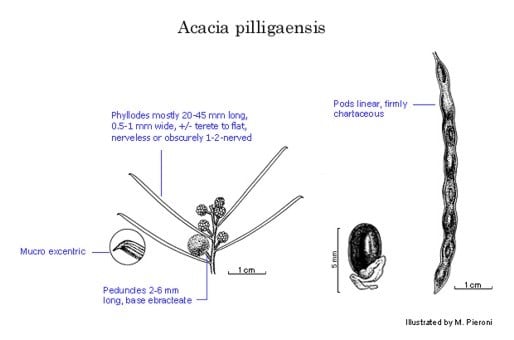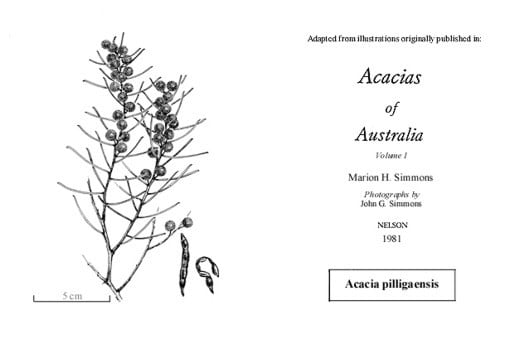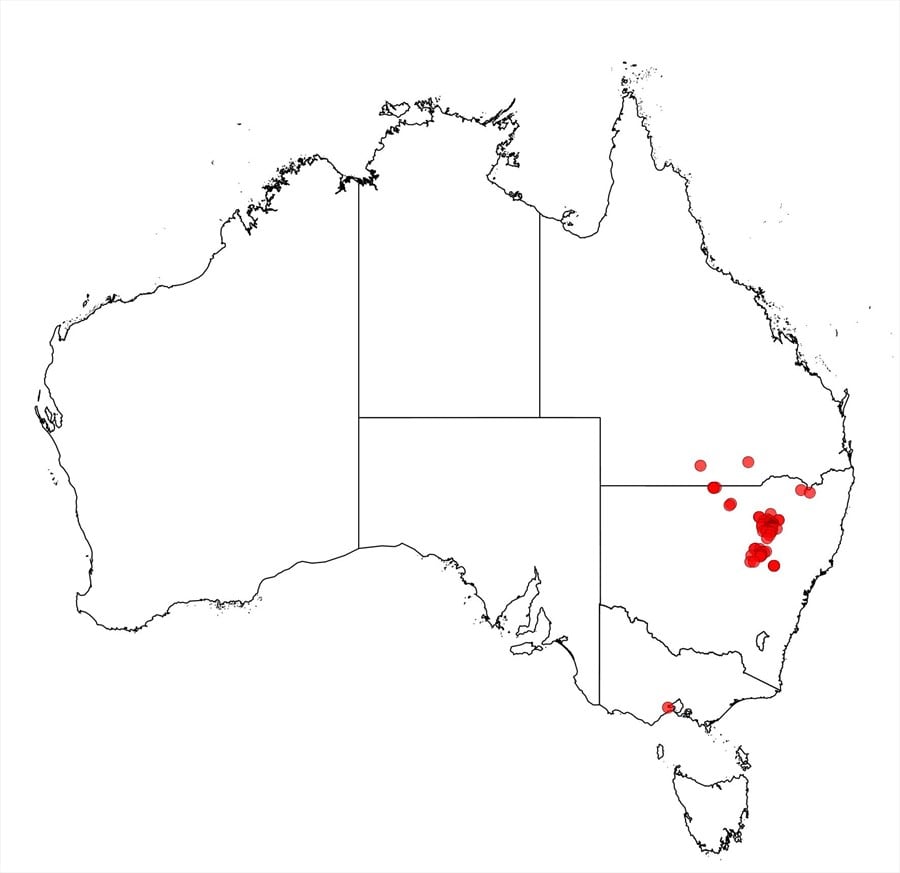Acacia pilligaensis Maiden
WATTLE
Acacias of Australia
Common Name
Pinbush Wattle, Pilliga Wattle
Family
Fabaceae
Distribution
Occurs in N.S.W. from near the Qld border S to Goonoo State Forest; it is common in the Pilliga Scrub near Narrabri. J.H.Maiden, J. & Proc. Roy. Soc. New South Wales 53: 187 (1920), considered a specimen from Home Rule, near Gulgong, c. 60 km SE of Goonoo State Forest as perhaps having incorrect locality details (i.e. J.L.Boorman, Sept. 1916, K, NSW).
Description
Bushy much-branched shrub to 2 (-4) m high. Branchlets glabrous to puberulous-hirsutellous, ±resinous and angled at extremities. Phyllodes frequently subcrowded, ascending to erect, infrequently patent, slender, straight to shallowly incurved, ±terete or more commonly subterete to flat, (15–) 20–45 mm long, 0.5–1 mm wide, obliquely and excentrically mucronulate, glabrous or subglabrous, nerveless or with 1 (central) or 2 obscure nerves on each face; gland basal, minute, sometimes absent, with a similar gland sometimes adjacent to the mucro. Inflorescences simple, 1 per axil; peduncles 2–6 mm long, glabrous to puberulous-hirsutellous; heads globular, 20–34-flowered, bright golden, resinous when young. Flowers 5-merous; sepals united to near apex. Pods linear, to 7 cm long, 3–4 mm wide, firmly chartaceous to very thinly coriaceous, dark brown, glabrous, slightly resinous. Seeds longitudinal, oblong, 3.5–4 mm long; aril oblique.
Habitat
Grows in sand in dry sclerophyll forest, woodland and shrubland.
Specimens
N.S.W.: Boyben, on the Gilgandra–Mendooran road, W.McReaddie AC39 (NSW); between the Gwydir and McIntyre Rivers, E.H.F.Swain 41 (NSW, PERTH); Sandy Ck, 75.5 km NE of Coonabarabran, T. & J.Whaite 3420 (NSW).
Notes
The N.S.W. and Qld specimens of uncertain affinity that were cited by J.H.Maiden in the protologue are regarded as A. pilligaensis and A. johnsonii respectively. These two species appear to be very closely related (both members of the ‘A. johnsonii group’) with A. johnsonii being distinguished by its slightly broader phyllodes. Similar to A. burbidgeae which has subterete phyllodes with a discrete medial groove and a broad lower margin, and longer peduncles.
FOA Reference
Data derived from Flora of Australia Volumes 11A (2001), 11B (2001) and 12 (1998), products of ABRS, ©Commonwealth of Australia
Author
B.R.Maslin
Minor edits by B.R.Maslin
This identification key and fact sheets are available as a mobile application:
URL: https://apps.lucidcentral.org/wattle/
© Copyright 2018. All rights reserved.








